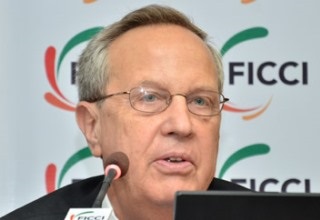Online courses to bridge gap between industry & academia: Yale Professor
Updated: Nov 07, 2014 12:37:06pm

Speaking at a round table discussion on ‘Creating an Innovation Bridge between Industry and Academia’ on November-6, CEO, Coursera Inc and former President of Yale University, Levin said, “The unprecedented scale of MOOC, cost effectiveness and interactive features to engage learners has added to its popularity.” “MOOC offers the right blend of theoretical and practical curriculum with features such as short, modular videos, in-video quizzes, auto-graded assignments, instant feedback, peer grading, projects and online discussion, which suits the needs of present day industry,” he added. However, he pointed out that MOOC does not intent to replace the traditional academic system.
“Its aim is to supplement the existing pedagogy, with relevant exposure to industry-centric knowledge. MOOC credentials are now listed on LinkedIn profiles, engineers at C3 Energy are paid to take Coursera’s machine learning course, the Singapore government is paying for hundreds to study data science and companies are sponsoring capstone projects and interviewing those with best projects. These instances demonstrate both the reach and significance of MOOC,” Levin elaborated.
On Coursera, Levin said that it is an education platform that partners with top universities and organizations worldwide, to offer courses online for anyone to take, for free. It provides 853 courses in various disciplines and partners with 114 universities and 8 other entities and enjoys the highest market share in MOOC education.
Also speaking on the occasion, Senior Director, FICCI, Shobha Mishra Ghosh said, “Despite the rise in graduate unemployment, little research has been conducted in the past to identify the kinds of skills demanded by employers and measure by which graduates meet employers’ expectation.
She said that FICCI and the World Bank are jointly conducting a follow up survey to understand employers’ perception/satisfaction levels regarding the new engineering graduates, the results of which will be shared during the 10th FICCI Higher Education Summit to be held on November 13-14, 2014 in New Delhi. The first survey of this kind was carried out in 2009 jointly by FICCI and World Bank.
Ghosh also spoke about the National Knowledge Functional Hub (NKFH), an initiative of FICCI to create an institutional mechanism for sustained industry-academia engagement and ensure employable engineering graduates for the manufacturing sector in India.
It needs mention that the rapid and sustained growth of Indian Industry over the past few years combined with challenges emerging due to globalization and knowledge economy has resulted in demand for high order of soft and technical skills in graduates in engineering and other streams. Although, there is a substantial increase in enrolment in engineering and higher education institutions, there is decline in the quality of engineering and general graduates as skill gap has become one of the prime challenges faced by the industry.
It was to deliberate on this issue that FICCI organized the business conference. Focus areas were - need for industry –academia engagement for overall growth of economy; innovations for strengthening industry- academia engagement; lessons from the US and other developed/emerging nations; and to ideate a framework for creating a symbiotic relationship between industry and academia in India.
The discussion saw the presence of leaders from the government, industry and higher education sector. (KNN Bureau)












